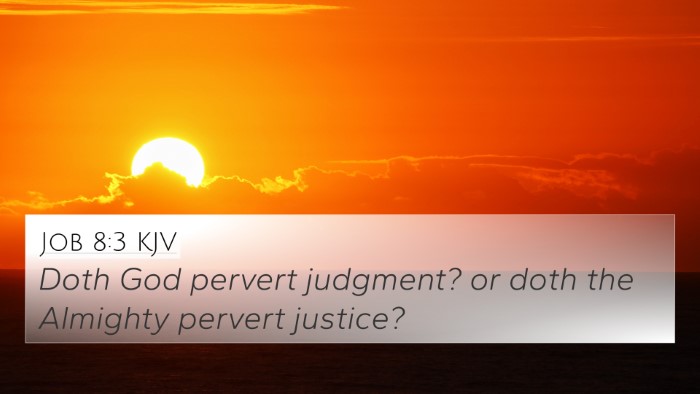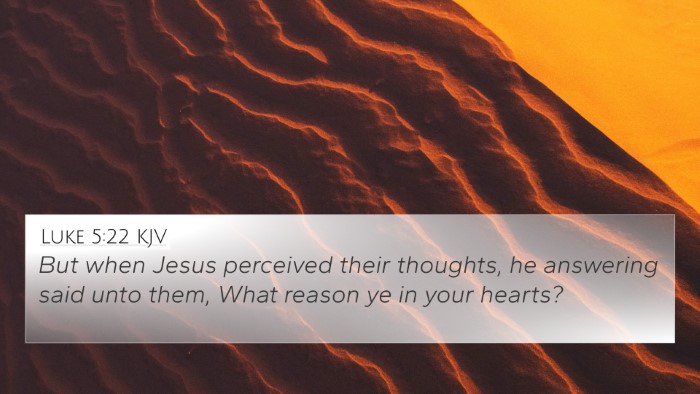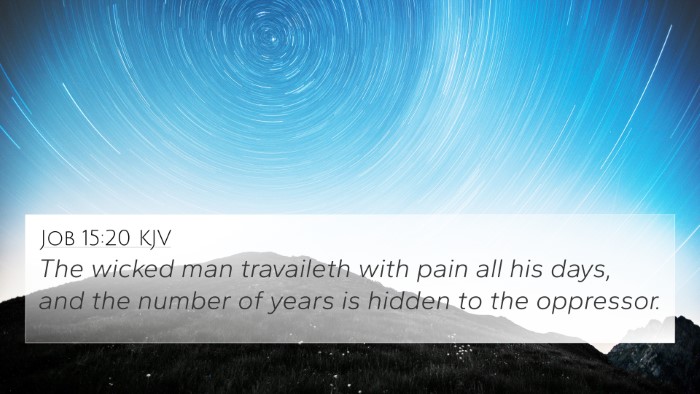Understanding Job 21:27
Job 21:27 is part of a profound discourse in which Job articulates his grievances about the injustices he perceives in the world. In this verse, Job acknowledges that he is aware of the hidden motivations of others, presenting a critical observation about the human condition.
Verse Text
"Behold, I know your thoughts, and the devices which ye wrongfully imagine against me." (Job 21:27 KJV)
Interpretation and Commentary
The insights from various public domain commentaries can deepen our understanding of this scripture. Below are synthesized interpretations from key commentators:
-
Matthew Henry:
Matthew Henry emphasizes Job's understanding of his friends' underlying intentions, highlighting that often, people harbor thoughts and schemes against others, even if not openly expressed. Job's statement serves to unmask the deceitful planning that occurs in human relationships, showcasing his awareness and insightful commentary on the nature of human thought.
-
Albert Barnes:
Albert Barnes expands on the theme of injustice by noting that Job is not just speaking about his personal plight but addressing broader themes of righteousness and suffering. He suggests that Job's ability to grasp the intentions of his accusers reveals the deeper reality of their moral failures injudging Job without understanding his true circumstances.
-
Adam Clarke:
Adam Clarke points out that Job’s perception is sharp; he readily identifies the motives of those around him. He interprets the devices mentioned by Job as a reflection of human tendencies to misjudge and falsely accuse others based on superficial knowledge. Clarke urges a recognition of personal biases that may cloud judgment.
Key Themes
This verse encapsulates several crucial themes:
- Awareness of Human Deceit: Job recognizes the insincerity in others.
- Suffering and Justice: The struggle between righteousness and the apparent prosperity of the wicked.
- Divine Oversight: The assurance that God observes all thoughts and intentions, providing a cosmic scale of justice.
Cross-References
To further explore the connections within the Scriptures, here are several relevant cross-references related to Job 21:27:
- Psalms 94:11: "The Lord knows the thoughts of man, that they are vanity."
- Proverbs 24:9: "The thought of foolishness is sin; and the scorner is an abomination to men."
- Jeremiah 17:10: "I the Lord search the heart, I try the reins, even to give every man according to his ways, and according to the fruit of his doings."
- Lamentations 3:40: "Let us search and try our ways, and turn again to the Lord."
- Matthew 9:4: "And Jesus knowing their thoughts said, Wherefore think ye evil in your hearts?"
- Hebrews 4:12: "For the word of God is quick, and powerful, and sharper than any two-edged sword, piercing even to the dividing asunder of soul and spirit..."
- 1 Corinthians 3:20: "And again, The Lord knoweth the thoughts of the wise, that they are vain."
- Philippians 4:8: "Finally, brethren, whatsoever things are true, whatsoever things are honest, whatsoever things are just..."
- Ecclesiastes 7:25: "I applied my heart to know, and to search, and to seek out wisdom, and the reason of things..."
- James 1:26: "If any man among you seem to be religious, and bridleth not his tongue, but deceiveth his own heart, this man's religion is vain."
Conclusion
Job 21:27 challenges readers to reflect on the nature of human thought and the complexities of interpersonal relationships, underscoring that God acknowledges the genuine motives behind our thoughts. This verse encourages a deeper examination of our judgments and the intentions we attribute to others.
Further Study and Tools for Cross-Referencing
Utilizing tools for Bible cross-referencing can provide a more enriched understanding of Scripture themes and connections. Consider exploring:
- Bible concordances
- Bible cross-reference guides
- Comprehensive Bible cross-reference materials
- Cross-reference Bible study methods














